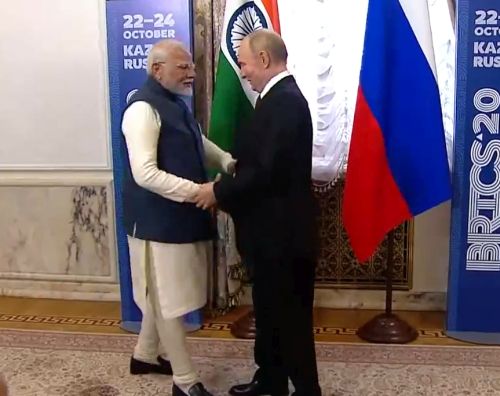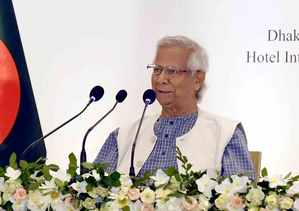International
IANS Analysis: China's declining arms exports over substandard quality, importers struggle
New Delhi: China’s arms exports have significantly declined over the past decade due to issues related to poor quality, compatibility problems, and substandard operational performance.
Although many countries have been compelled to purchase military imports from China because of lower costs and coercive economic influence, numerous reports highlight recurrent defects, inadequate technical support, and lack of spare parts, underscoring a serious quality issue within China’s military-industrial complex.
Major importers frequently cite hidden costs and technological incompatibility as additional factors adversely affecting China’s arms exports.
The agreement for four multi-role Tughril class (Type 054A/P) frigates for the Pakistan Navy was finalised between Pakistan and China in June 2017-18 with considerable fanfare, grandiose rhetoric, and lofty promises of resolving the Pakistan Navy’s persistent, decade-long issues with ‘Made in China’ ships. However, these vessels have experienced several significant machinery defects. The combat systems, including missiles and torpedoes, have yet to demonstrate their intended operational capability.
Interestingly, in 2013, China offered three Type 054A ships to the Royal Thai Navy for $1 billion. However, the Royal Thai Navy opted for a variant of the South Korean ‘Gwanggaeto the Great’
Class Destroyer from Daewoo Shipbuilding & Marine Engineering instead. The reasons behind this decision are becoming evident amid the growing crisis faced by developing nations that heavily depend on cheaper defence imports from Chinese manufacturers.
These pieces of equipment, introduced with much fanfare, quickly end up operating well below their intended capacity and desired performance due to an increasing rate of failures, lack of spare parts, and dwindling support from the Chinese original equipment manufacturers. Additionally, the consistent unavailability of system experts has exacerbated the existing problems.
“Their most significant considerations in arms procurement are price and politics, with corruption playing a prominent role. China can offer weapons at a low cost, with hefty discounts or bribes for officials in charge of the procurement and go-between individuals,” writes Tanmay Kadam in a Eurasian Times article.
In the post-COVID world order, marked by the severe economic and financial crises in Pakistan and Sri Lanka, China’s reputation among other nations has been called into question. This issue extends beyond Pakistan, as the Harbin Z9 helicopters exported to Cambodia and Cameroon have also experienced a notable failure rate.
Bangladesh, a significant purchaser of Chinese defence equipment has encountered substantial problems with the performance and operational availability of its Chinese ships, F-7 fighter aircraft, MBT 2000 tanks, K-8W jet trainer aircraft, and Ming-class submarines.
Earlier this year, the United Arab Emirates (UAE) also returned Chinese Wing Loong II drones due to subpar performance and recurring defects. Consequently, the UAE is expected to acquire Turkish Bayraktar TB2 drones, thereby diminishing its defence import relations with China. Nigeria, similarly, has relied heavily on Chinese military equipment, including VT-4 tanks and fire support vehicles. However, the proposed establishment of an aircraft spare production facility in Nigeria has yet to materialise.
Several Chinese-made F7 and JF17 aircraft imported by Myanmar have also been lost in crashes due to the failure of critical equipment. Furthermore, the additional charges imposed by Chinese manufacturers and significant delays compelled Myanmar to seek expertise on the JF17 from Pakistan. Issues have also been reported with the Beyond Visual Range missiles and the aircraft’s radars.
Chinese military export equipment has undeniably been lagging behind the world’s major weapon manufacturers in terms of electronic reliability, engine failures during extended operations, and the quality of composite materials used.
According to the Stockholm International Peace Research Institute (SIPRI), China’s exports decreased by 7.8 per cent between 2016 and 2020 compared to the preceding five-year period.
Primarily reverse-engineered from Western or Russian military technology, the lack of available spare parts affects the operational readiness of key platforms during the emergent crisis. This creates a challenging situation for importing countries to manage unforeseen crises amid the current tense geopolitical environment.
There is increasing dissatisfaction among developing countries, as they perceive Chinese manufacturers as unreliable investors in the expansion of the weapons trade. Existing customers, who have already invested significant funds, find themselves with no viable options to withdraw from these arrangements.
–IANS
svn
International
Lee Hsien Yang seeks refuge in United Kingdom

Lee Hsien Yang, the youngest son of Singapore’s founding father, the late Lee Kuan Yew, announced on Tuesday that he is now a political refugee in the United Kingdom after seeking asylum from the British government “as a last resort.”
“I remain a Singapore citizen and hope that someday it will be safe to return home,” Lee stated in a Facebook post, as reported by Channel News Asia (CNA).
Citing what he described as the Singapore government’s “attacks” against him, Lee, who is the younger brother of former Prime Minister Lee Hsien Loong, revealed that he sought asylum protection in 2022.
Lee Hsien Yang and his late sister, Lee Wei Ling, who passed away earlier this month, have been in conflict with their brother Lee Hsien Loong over the fate of their father’s home following his death in 2015, resulting in a public dispute that has estranged the siblings.
In an interview with the UK-based newspaper The Guardian, Lee alleged that a “campaign of persecution” compelled him to seek asylum in Britain.
In response to his claims, the Singapore government stated that there is “no basis” for his allegations of “a campaign of persecution” or other assertions regarding political repression in the country.
“Singapore’s judiciary is impartial and makes decisions independently. This is why Singaporeans have a high level of trust in the judiciary,” a government spokesperson remarked.
The spokesperson added that there are no legal restrictions preventing Lee and his wife, lawyer Lee Suet Fern, from returning to Singapore. “They are and have always been free to return to Singapore,” the spokesperson said.
Lee and his wife have been outside of Singapore since 2022, having opted not to attend a scheduled police interview regarding potential offenses related to providing false evidence in judicial proceedings concerning their father’s will and the family home.
Lee and his late sister, who had been living at the property, alleged they felt threatened while trying to fulfill their father’s wish to demolish the house. They also accused their elder brother, former Prime Minister Lee Hsien Loong, of abusing his governmental influence to advance his personal agenda.
International
Indo-Russian ties are stronger than ever before at BRICS

Kazan, Russia: Prime Minister Narendra Modi held a bilateral meeting with Russian President Vladimir Putin on the sidelines of the 16th BRICS Summit.
During the meeting, President Putin remarked, “I recall our meeting in July, where we had productive discussions on various issues. We’ve also spoken over the phone several times. I am very grateful you accepted the invitation to come to Kazan. Today, we will attend the BRICS Summit’s opening ceremony, followed by dinner.”
PM Modi responded by expressing his appreciation, saying, “I sincerely thank you for your friendship, warm welcome, and hospitality. It’s a great pleasure to visit such a beautiful city as Kazan for the BRICS Summit. India shares deep historical ties with this city, and the opening of our new embassy here will further strengthen these connections.”
International
Laos seeks to enhance nutrition amid climate change concerns

Vientiane (Laos), Aug 22 (IANS) Representatives from the Lao government and development partners have attended a conference here titled “Climate Change and Nutrition in Laos: Intersections and Interventions” to discuss the impact of climate change on nutrition in the Southeast Asia country and potential solutions.
Speaking at the conference, deputy director general of the Department of Hygiene and Health Promotion under the Lao Ministry of Health Viengkhan Phixay, said, “We gather to address a critical and interwoven issue: the impact of climate change on nutrition and how we can work together to tackle these challenges,” Xinhua news agency reported.
The Lao government is actively engaged in this endeavor, with numerous policies and initiatives aimed at addressing both climate change and nutrition, Lao National Television reported on Thursday.
“By leveraging the Scaling Up Nutrition network in Laos, which is led by the government, and supported by civil society, donors, and the United Nations, we have a robust platform to tackle the negative impacts of climate change while improving nutrition and overall health for everyone in Laos,” Viengkham said at the conference held on Monday.
The conference featured a series of presentations that not only detailed evidence-based research but also introduced innovative tools for measuring and enhancing nutrition under the impact of climate change.
The conference stressed the critical need for integrated approaches to tackle the intertwined challenges of climate change and nutrition, and setting the stage for impactful future collaborations.
–IANS
int/psd
International
One killed, seven injured in shootout in Iraq

Baghdad, Aug 22 (IANS) A civilian was killed while seven others were injured on Thursday in a tribal shootout in Iraq’s holy Shiite province of Najaf, according to a local security source.
The shootout erupted in the early hours between armed men from the local tribe in the al-Zarga area in northern Najaf, some 160 km south of Baghdad, a local police officer told Xinhua on condition of anonymity.
The clash resulted in the killing of an Iraqi civilian and the injury of seven others, including three Iranian Shiite pilgrims, the source added.
A joint force from the Interior Ministry’s emergency response division and Najaf provincial police arrested 53 gunmen from both sides of the shootout and seized weapons and ammunition, the Interior Ministry said in a statement.
It added that search operations are ongoing to locate additional gunmen and weapons, with more details to be released later.
The incident took place as numerous pilgrims traveled to the city of Karbala to observe Arbaeen, which marks the end of a 40-day mourning period for the killing of Imam Hussein, the grandson of Prophet Muhammad, in the Battle of Karbala in 680 A.D.
Typically, these pilgrims also visit Najaf as part of their journey to Karbala.
–IANS
int/jk/arm
International
Bangladesh seeks $1 billion budget support from World Bank

Dhaka, Aug 22 (IANS) Bangladesh’s interim government has sought $1 billion from the World Bank as budgetary support.
The call came from the country’s Power, Energy and Mineral Resources Adviser Muhammad Fouzul Kabir Khan’s meeting with Abdoulaye Seck, the World Bank’s Country Director for Bangladesh and Bhutan, in Dhaka on Wednesday.
He made the plea as the ministry owes more than 2 billion dollars to suppliers in import costs of power and energy, Xinhua news agency reported.
Khan mentioned that the interim government, which was formed with many pressing mandates, is due to settle a $2 billion debt left by the previous government in the power sector.
He said they have already suspended activities under the much-criticized Quick Enhancement of Electricity and Energy Supply Act 2010 and abolished the government’s power to set energy prices without any public hearing.
On August 5, the former Prime Minister of Bangladesh, Sheikh Hasina, was ousted from her country and power, ending her rule since January 2009.
This event was seen as a massive escalation, with what initially started as student’s protests and resulted in a major crisis in Bangladesh.
Earlier on August 8, Nobel laureate Muhammad Yunus took oath as the head of Bangladesh’s interim government.
–IANS
int/jk/as
-
Video2 years ago
PM Modi Attacks Congress in Karnataka with “Kerala Story”
-
Politics2 years ago
Siddaramaiah & DK Shivakumar sworn in as Chief Minister & Deputy CM respectively
-
Cricket2 years ago
CSK players rejoice 5th IPL title with their families (Pics)
-
Entertainment2 years ago
Karan Deol weds his longtime Girlfriend Drisha Acharya (Pics)
-
Sports7 years ago
History Of Official FIFA WORLD CUP Match balls
-
Entertainment2 years ago
Urvashi Rautela dazzles on Cannes 2023 red carpet (Pics)
-
India2 years ago
Ashwini Vaishnaw: Railway Board recommends CBI probe in the Odisha railway disaster
-
Entertainment2 years ago
Sunny Leone gets ready for Kennedy premiere in Cannes (Pics)






























